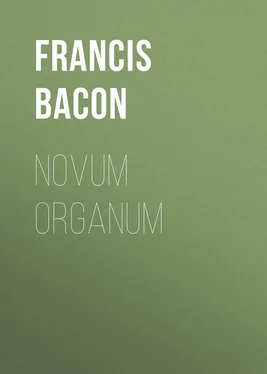Francis Bacon - Novum Organum
Здесь есть возможность читать онлайн «Francis Bacon - Novum Organum» — ознакомительный отрывок электронной книги совершенно бесплатно, а после прочтения отрывка купить полную версию. В некоторых случаях можно слушать аудио, скачать через торрент в формате fb2 и присутствует краткое содержание. Жанр: foreign_antique, foreign_prose, на английском языке. Описание произведения, (предисловие) а так же отзывы посетителей доступны на портале библиотеки ЛибКат.
- Название:Novum Organum
- Автор:
- Жанр:
- Год:неизвестен
- ISBN:нет данных
- Рейтинг книги:4 / 5. Голосов: 1
-
Избранное:Добавить в избранное
- Отзывы:
-
Ваша оценка:
- 80
- 1
- 2
- 3
- 4
- 5
Novum Organum: краткое содержание, описание и аннотация
Предлагаем к чтению аннотацию, описание, краткое содержание или предисловие (зависит от того, что написал сам автор книги «Novum Organum»). Если вы не нашли необходимую информацию о книге — напишите в комментариях, мы постараемся отыскать её.
Novum Organum — читать онлайн ознакомительный отрывок
Ниже представлен текст книги, разбитый по страницам. Система сохранения места последней прочитанной страницы, позволяет с удобством читать онлайн бесплатно книгу «Novum Organum», без необходимости каждый раз заново искать на чём Вы остановились. Поставьте закладку, и сможете в любой момент перейти на страницу, на которой закончили чтение.
Интервал:
Закладка:
LXXI. The sciences we possess have been principally derived from the Greeks; for the addition of the Roman, Arabic, or more modern writers, are but few and of small importance, and such as they are, are founded on the basis of Greek invention. But the wisdom of the Greeks was professional and disputatious, and thus most adverse to the investigation of truth. The name, therefore, of sophists, which the contemptuous spirit of those who deemed themselves philosophers, rejected and transferred to the rhetoricians – Gorgias, 36 36 Gorgias of Leontium went to Athens in 424 B.C. He and Polus were disciples of Empedocles, whom we have already noticed ( Aphorism 63 ), where he sustained the three famous propositions, that nothing exists, that nothing can be known, and that it is out of the power of man to transmit or communicate intelligence. He is reckoned one of the earliest writers on the art of rhetoric, and for that reason, Plato called his elegant dialogue on that subject after his name.
Protagoras, Hippias, Polus – might well suit the whole tribe, such as Plato, Aristotle, Zeno, Epicurus, Theophrastus, and their successors – Chrysippus, Carneades, and the rest. There was only this difference between them – the former were mercenary vagabonds, travelling about to different states, making a show of their wisdom, and requiring pay; the latter more dignified and noble, in possession of fixed habitations, opening schools, and teaching philosophy gratuitously. Both, however (though differing in other respects), were professorial, and reduced every subject to controversy, establishing and defending certain sects and dogmas of philosophy, so that their doctrines were nearly (what Dionysius not unaptly objected to Plato) the talk of idle old men to ignorant youths. But the more ancient Greeks, as Empedocles, Anaxagoras, Leucippus, Democritus, Parmenides, Heraclitus, Xenophanes, Philolaus, and the rest 37 37 Chrysippus, a stoic philosopher of Soli in Cilicia, Campestris, born in 280, died in the 143d Olympiad, 208 B.C. He was equally distinguished for natural abilities and industry, seldom suffering a day to elapse without writing 500 lines. He wrote several hundred volumes, of which three hundred were on logical subjects; but in all, borrowed largely from others. He was very fond of the sorites in argument, which is hence called by Persius the heap of Chrysippus. He was called the Column of the Portico, a name given to the Stoical School from Zeno, its founder, who had given his lessons under the portico. Carneades, born about 215, died in 130. He attached himself to Chrysippus, and sustained with éclat the scepticism of the academy. The Athenians sent him with Critolaus and Diogenes as ambassador to Rome, where he attracted the attention of his new auditory by the subtilty of his reasoning, and the fluency and vehemence of his language. Before Galba and Cato the Censor, he harangued with great variety of thought and copiousness of diction in praise of justice. The next day, to establish his doctrine of the uncertainty of human knowledge, he undertook to refute all his arguments. He maintained with the New Academy, that the senses, the imagination, and the understanding frequently deceive us, and therefore cannot be infallible judges of truth, but that from the impressions produced on the mind by means of the senses, we infer appearances of truth or probabilities. Nevertheless, with respect to the conduct of life, Carneades held that probable opinions are a sufficient guide. Xenophanes, a Greek philosopher, of Colophon, born in 556, the founder of the Eleatic school, which owes its fame principally to Parmenides. Wild in his opinions about astronomy, he supposed that the stars were extinguished every morning, and rekindled at night; that eclipses were occasioned by the temporary extinction of the sun, and that there were several suns for the convenience of the different climates of the earth. Yet this man held the chair of philosophy at Athens for seventy years. Philolaus, a Pythagorean philosopher of Crotona, B.C. 374. He first supported the diurnal motion of the earth round its axis, and its annual motion round the sun. Cicero (Acad. iv. 39) has ascribed this opinion to the Syracusan philosopher Nicetas, and likewise to Plato. From this passage, it is most probable that Copernicus got the idea of the system he afterward established. Bacon, in the Advancement of Human Learning, charges Gilbert with restoring the doctrines of Philolaus, because he ventured to support the Copernican theory. — Ed.
(for I omit Pythagoras as being superstitious), did not (that we are aware) open schools, but betook themselves to the investigation of truth with greater silence and with more severity and simplicity, that is, with less affectation and ostentation. Hence in our opinion they acted more advisedly, however their works may have been eclipsed in course of time by those lighter productions which better correspond with and please the apprehensions and passions of the vulgar; for time, like a river, 38 38 Bacon is equally conspicuous for the use and abuse of analogical illustrations. The levity, as Stuart Mill very properly observes, by which substances float on a stream, and the levity which is synonymous with worthlessness, have nothing beside the name in common; and to show how little value there is in the figure, we need only change the word into buoyancy, to turn the semblance of Bacon’s argument against himself. — Ed.
bears down to us that which is light and inflated, and sinks that which is heavy and solid. Nor were even these more ancient philosophers free from the national defect, but inclined too much to the ambition and vanity of forming a sect, and captivating public opinion, and we must despair of any inquiry after truth when it condescends to such trifles. Nor must we omit the opinion, or rather prophecy, of an Egyptian priest with regard to the Greeks, that they would forever remain children, without any antiquity of knowledge or knowledge of antiquity; for they certainly have this in common with children, that they are prone to talking, and incapable of generation, their wisdom being loquacious and unproductive of effects. Hence the external signs derived from the origin and birthplace of our present philosophy are not favorable.
LXXII. Nor are those much better which can be deduced from the character of the time and age, than the former from that of the country and nation; for in that age the knowledge both of time and of the world was confined and meagre, which is one of the worst evils for those who rely entirely on experience – they had not a thousand years of history worthy of that name, but mere fables and ancient traditions; they were acquainted with but a small portion of the regions and countries of the world, for they indiscriminately called all nations situated far toward the north Scythians, all those to the west Celts; they knew nothing of Africa but the nearest part of Ethiopia, or of Asia beyond the Ganges, and had not even heard any sure and clear tradition of the regions of the New World. Besides, a vast number of climates and zones, in which innumerable nations live and breathe, were pronounced by them to be uninhabitable; nay, the travels of Democritus, Plato, and Pythagoras, which were not extensive, but rather mere excursions from home, were considered as something vast. But in our times many parts of the New World, and every extremity of the Old, are well known, and the mass of experiments has been infinitely increased; wherefore, if external signs were to be taken from the time of the nativity or procreation (as in astrology), nothing extraordinary could be predicted of these early systems of philosophy.
LXXIII. Of all signs there is none more certain or worthy than that of the fruits produced, for the fruits and effects are the sureties and vouchers, as it were, for the truth of philosophy. Now, from the systems of the Greeks, and their subordinate divisions in particular branches of the sciences during so long a period, scarcely one single experiment can be culled that has a tendency to elevate or assist mankind, and can be fairly set down to the speculations and doctrines of their philosophy. Celsus candidly and wisely confesses as much, when he observes that experiments were first discovered in medicine, and that men afterward built their philosophical systems upon them, and searched for and assigned causes, instead of the inverse method of discovering and deriving experiments from philosophy and the knowledge of causes; it is not, therefore, wonderful that the Egyptians (who bestowed divinity and sacred honors on the authors of new inventions) should have consecrated more images of brutes than of men, for the brutes by their natural instinct made many discoveries, while men derived but few from discussion and the conclusions of reason.
Читать дальшеИнтервал:
Закладка:
Похожие книги на «Novum Organum»
Представляем Вашему вниманию похожие книги на «Novum Organum» списком для выбора. Мы отобрали схожую по названию и смыслу литературу в надежде предоставить читателям больше вариантов отыскать новые, интересные, ещё непрочитанные произведения.
Обсуждение, отзывы о книге «Novum Organum» и просто собственные мнения читателей. Оставьте ваши комментарии, напишите, что Вы думаете о произведении, его смысле или главных героях. Укажите что конкретно понравилось, а что нет, и почему Вы так считаете.












